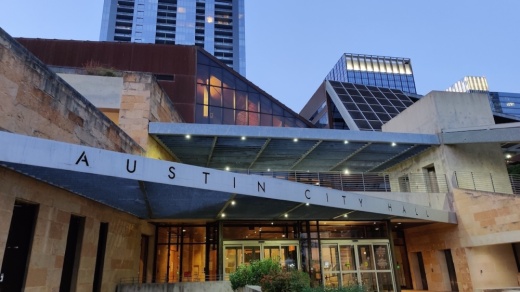Following the voting session, two of the more high-profile items on council's agenda will have to wait several more weeks to potentially pass. Council next meets for a work session May 3 and a regular meeting May 5.
Guaranteed income pilot, vertical mixed-use development program expansion delayed
Officials decided to postpone their vote on the trial run of a $1.18 million guaranteed income program. If approved, the initiative sponsored by Mayor Steve Adler would have the city send $1,000 checks to 85 households over the course of one year. If successful, the pilot could potentially be repeated and expanded in the future.
Council members said the postponement did not necessarily represent opposition to the concept, but several noted a need to get more clarifications from city staff and clear up miscommunications with community members.
An expansion of Austin's vertical mixed-use, or VMU, development program was also pushed off until next month.
The addition of a VMU2 zoning designation that could bring taller buildings and more affordable housing along major transit corridors is one that already has general support on the council dais. However, officials said more time is needed for community discussions about the update and how it ties into other land-use issues council may be looking to tackle this year.
Mayor Pro Tem Alison Alter also said the consensus point of support for denser development on corridors is something council should specifically focus more on this year, after past housing discussions that considered bringing density deeper into neighborhoods "distracted" council from other policy updates.
Council is set to dive back into VMU2 during its May 17 work session, with a final vote on the city code amendment coming June 9.
Council closes renter rights loophole

A city code amendment proposed by District 4 Council Member Chito Vela also passed unanimously April 21. Vela and several council members attending a press conference on the update said it closes a "loophole" in city rules that may have allowed landlords to force out tenants amid renovations or redevelopment of residential spaces. The action follows council's 2016 code update that originally set some protections for renters in complexes up for demolition.
Vela said the change will grant renters more security if they are at risk of displacement.
“We really don’t want to see people out on the streets. We really don’t want to see people dislocated like this," Vela said. "When we spoke to the tenants, what they wanted was a little bit more time. More than anything they just needed more time to find a place.”
District 3 Council Member Pio Renteria also said the council action serves as a warning to landlords who may have been taking advantage of potential uncertainty in code.
"I know there’s a lot of pressure out there right now because of the way the housing is going, but that’s no excuse for having owners, people coming in and buying low-income apartments and then evicting people. We’re not going to stand by and tolerate these types of activities," he said. "You’re not going to be kicking out our tenants without having some kind of protection. And you’re going to have to make sure that you work with these tenants and find a solution."
Animal COVID-19 testing funds accepted
Council signed off on a $65,000 grant from the Council of State and Territorial Epidemiologists that will fund testing of cats for SARS-CoV-2, the virus that causes COVID-19.
The grant will fund a study by the Austin Humane Society, the Austin Animal Center, Texas A&M University and the Texas Department of State Health Services analyzing if and how the coronavirus spreads among animals—potentially affecting humans. The study will tie into the humane society and animal center's "trap-neuter-return" Community Cats initiative, according to the city.
“There is still a lot we don’t know about coronavirus and how it mutates, so we hope this study will help to identify best practices moving forward and help understand potential sources of mutated viruses that affect human health," said Dr. Katie Luke, the humane society's chief operations officer, in a statement.





